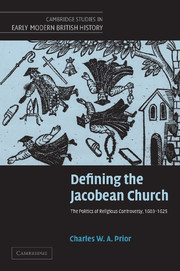Book contents
- Frontmatter
- Contents
- Acknowledgements
- Note on the text
- 1 Introduction: defining the Church
- 2 The language of ecclesiastical polity and Jacobean conformist thought
- 3 Doctrine, law, and conflict over the Canons of 1604
- 4 Apostoli, episcopi, divini?: models of ecclesiastical governance
- 5 Bellum ceremoniale: scripture, custom, and ceremonial practice
- 6 Ceremonies, episcopacy, and the Scottish Kirk
- 7 Conclusion: narratives of civil and ecclesiastical authority
- Bibliography
- Index
- Titles in the series
7 - Conclusion: narratives of civil and ecclesiastical authority
Published online by Cambridge University Press: 09 July 2009
- Frontmatter
- Contents
- Acknowledgements
- Note on the text
- 1 Introduction: defining the Church
- 2 The language of ecclesiastical polity and Jacobean conformist thought
- 3 Doctrine, law, and conflict over the Canons of 1604
- 4 Apostoli, episcopi, divini?: models of ecclesiastical governance
- 5 Bellum ceremoniale: scripture, custom, and ceremonial practice
- 6 Ceremonies, episcopacy, and the Scottish Kirk
- 7 Conclusion: narratives of civil and ecclesiastical authority
- Bibliography
- Index
- Titles in the series
Summary
We began with Gilbert Burnet's observation that the ‘disciplinarian’ controversies of the Jacobean period, while not pitched at the level of Whitgift and Hooker, nevertheless occupied a host of writers and served to define the principal ecclesiological divisions of the period. This book has shown that those writers who were concerned with the ecclesiology of the Jacobean Church were indeed deeply divided on fundamental issues of history, theology, law, and the political implications of monarchical sovereignty over a ‘national’ church. This book has traced these divisions through a series of thematic debates carried on in printed works that scholars of religion have not yet fully exploited. This literature reveals that the chief concern among these writers was not soteriology, but rather issues concerning doctrine, law, rites, and governance, all of which stemmed from the Elizabethan reconstruction and its Jacobean refinement. We commonly conceive of figures like Richard Hooker and John Jewel as part of an elite group of theologians, isolated from other writers, whose purpose was to provide scriptural and historical defences of the Church; yet, the case has been made that the problem of ‘defining’ the Jacobean Church absorbed a broad sample of writers, and lay at the heart of debates on governance and ceremonial practice that followed the introduction of the Canons of 1604.
Where others have posited conflict between Calvinists and Arminians, or between ‘puritans’ and a range of conformists, from ‘moderate’ to ‘avant-garde’, this study has examined the broadly based theme of conflict over the nature of the visible church.
- Type
- Chapter
- Information
- Defining the Jacobean ChurchThe Politics of Religious Controversy, 1603–1625, pp. 252 - 265Publisher: Cambridge University PressPrint publication year: 2005

